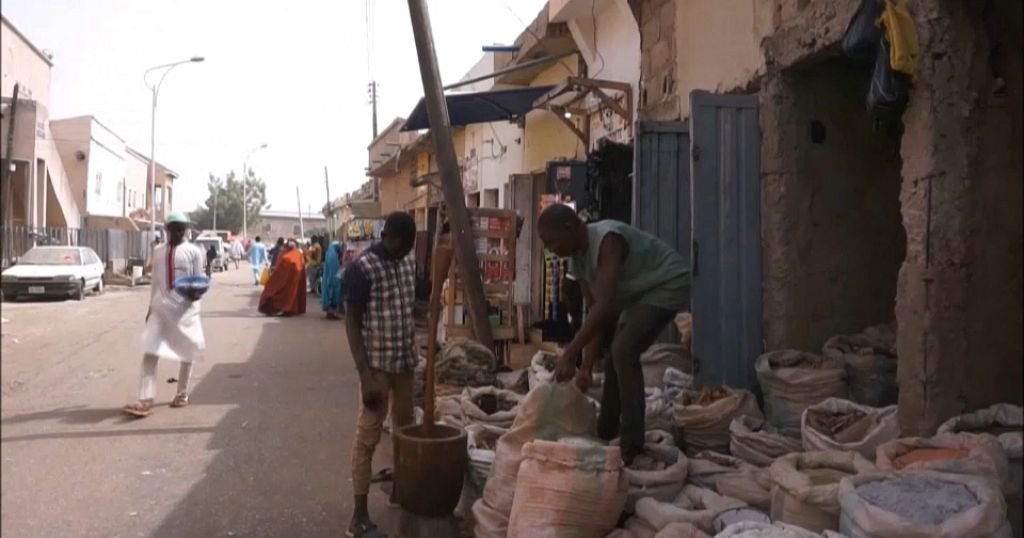Despite working in financial services in Kano, a city in northern Nigeria, Usman Ahmad turned to cheap drugs to treat his family’s illnesses two years ago after rapid inflation put modern medicines out of his budget. I started buying Chinese herbal medicine.
Africa’s most populous country is struggling with double-digit inflation, especially soaring food prices, and many Nigerians are looking for ways to save money on basic necessities.
Traditional herbal remedies have become a one-way street, even though the field is unregulated by health authorities and medical professionals often warn of the risks of bogus and even dangerous treatments. There is.
“My income can no longer support the ever-increasing hospital costs,” Ahmad told AFP outside an herbal kiosk selling anti-malarial formulas in Kano.
Ahmad’s hospital treatment cost 2,500 naira (about $6), but the anti-malarial compound cost 200 naira (2.09 cents).
Nigeria’s economy has been hit hard by the drop in global oil prices and the pandemic, which has reduced oil revenues, weakened the domestic naira and kept inflation at about 17%.
– A fraction of the price –
Economic pressure from low oil prices pushed Nigeria into recession in 2016 and 2020, pushing an additional 7 million people into poverty in 2020 alone, according to the World Bank’s Global Poverty Index.
Even before that, millions of Nigerians were living in poverty on less than $1 a day.
Although the culture of herbal medicine is deeply rooted in Nigeria, especially in traditional communities, medicine has become increasingly popular in recent years, even among Western-educated Nigerians like Ahmad.
Herbal shops and hawkers promising cures for all sorts of ailments, from the common flu to diseases such as cancer and diabetes, are common on the streets and markets.
Herb vendors advertise their concoctions on loudspeakers atop old cars, while others push strollers and carts filled with herbal concoctions through the streets.
“My economic situation has made me turn to herbs to treat my family’s illnesses,” Abubakar Khamis told AFP outside his herbal shop in the northern city of Katsina, a two-hour drive from Kano.
The 43-year-old father of seven, carrying a plastic bag filled with anti-malarial drugs, said it cost him a “fraction” of the cost of a hospital stay.
~Sales soar~
Herbalists say sales are surging and demand from cash-strapped customers is increasing.
Abubakar Khalid, an herbalist from Yakasai area of Kano city, said, “The number of customers has increased fourfold because we are dealing with people from different social backgrounds every day.”
Ibrahim Musa, a doctor at Aminu Kano Teaching Hospital, Kano’s largest medical facility, blamed the trend on inflation, where food costs are siphoning income.
Despite the recent emergence of health insurance for those with regular incomes, Nigerians typically pay for their health care out of pocket.
“Many people don’t have enough money to buy medicines,” says Musa, a consultant hematologist.
According to the World Health Organization (WHO), Nigeria has one of the worst health systems in the world, ranking 163rd out of 191 countries.
According to World Bank statistics, public spending on health is only 3.89% of Nigeria’s GDP of $495 billion, compared to 8.25% in South Africa, which has a population of 59 million, or one-third of Nigeria’s public spending. It’s not even enough.
According to the Nigerian Medical Association (MNA), there are only 40,000 doctors in Nigeria for a population of 210 million people, or two doctors for every 10,000 people. According to WHO standards, there is one doctor for every 600 people.
-Fake and fraud-
Nigeria imports 70% of its pharmaceutical needs. However, large quantities of fake and substandard drugs are entering the Nigerian market.
“People continue to lose faith in orthodox medicines,” Moosa said. “This causes them to turn to herbal preparations, which are much cheaper and more readily available.”
But the business is rife with quacks who falsely claim cures for a quick profit, herbal sellers say.
In 2017, Hajara Bashir’s husband died from internal bleeding after drinking a medicinal herbal medicine he had bought from a peddler outside his home in Katsina.
“He staggered into the house and was lying on the floor vomiting blood. There was no label on the bottle, so we couldn’t trace the source,” she said.
In December last year, drug and food watchdog organization NAFDAC warned Nigerians against using herbal medicines because of poor storage practices that expose the medicines to bacteria.
Adnan Muazzam Hyde, a doctor in Kano, said one of the major drawbacks of herbal medicine is the tendency to “treat all diseases with one treatment” and the tendency to treat diseases such as AIDS and cancer as incurable but manageable. He said that he was advocating a cure for the disease. And diabetes.
“People have lost trust in the health system and we need to win them back,” Moussa said.
“That is only possible if we strengthen our health systems through universal access, universal coverage and quality.”

